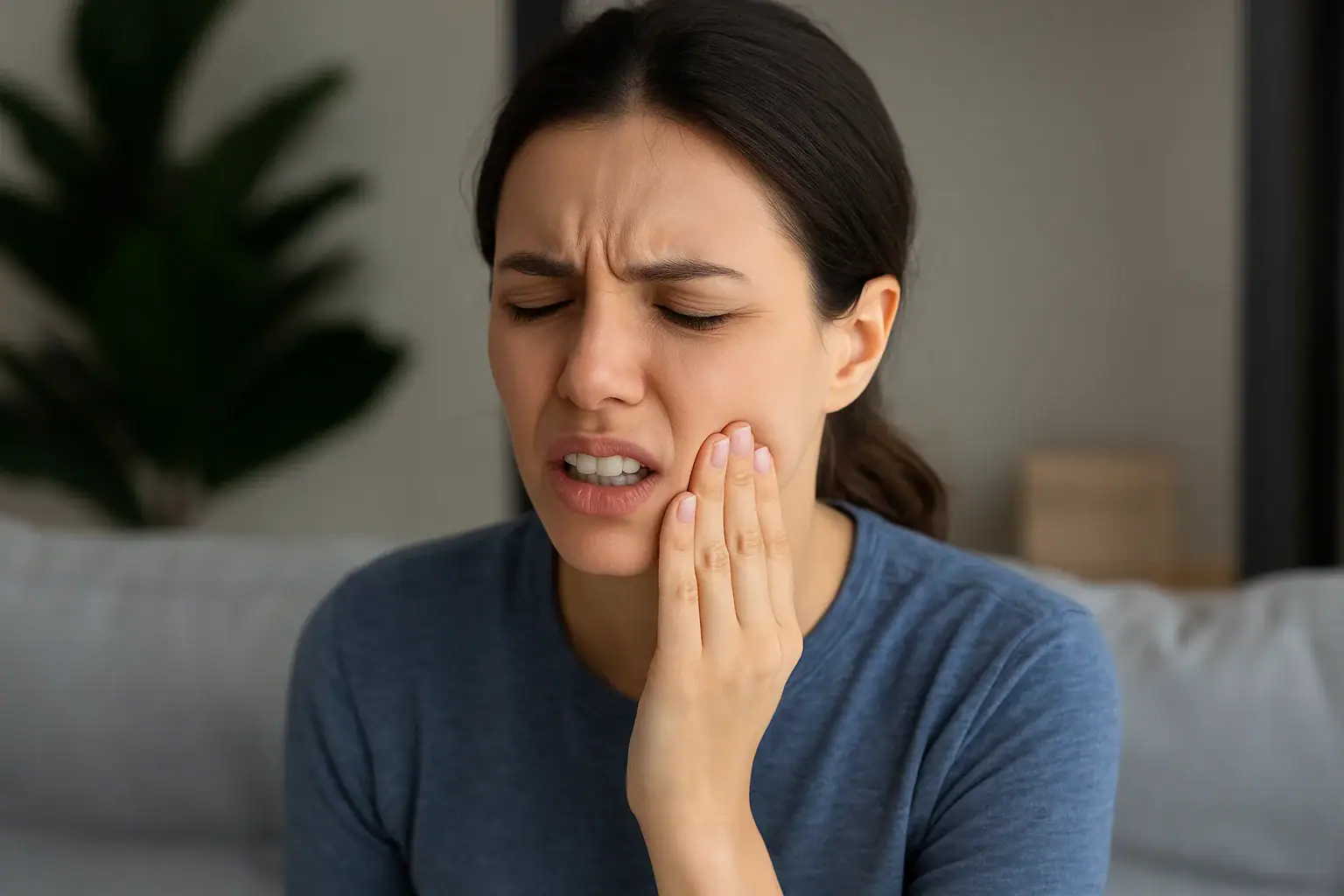Introduction
Tooth pain can range from a fleeting zing when you sip something cold to a deep, throbbing ache that keeps you up at night. If you’re asking “why do my teeth hurt?”, you’re not alone. Tooth and jaw discomfort can come from enamel, dentin, pulp (nerve), gums, bone, or even nearby structures like the sinuses and jaw joints. This guide breaks down the most common reasons teeth hurt, how to narrow down the cause based on your specific symptoms, what you can try at home, and when it’s time to call a dentist.
💡 Dental Insight: Tooth pain is a signal from your body that something needs attention sometimes urgently. Ignoring it can allow reversible conditions to progress into irreversible damage.
Fast Answers: Match Your Symptom to a Likely Cause
- Sharp zings to cold/sweets: enamel wear, gum recession, early cavity, exposed dentin, whitening sensitivity.
- Pain on chewing or “when I bite down”: cracked tooth, high filling/crown, cavity, gum abscess, sinus pressure on upper molars.
- Multiple teeth hurt “suddenly”: sinus infection, night grinding/clenching, aggressive whitening, recent braces adjustments, stress-related jaw tension.
- Teeth hurt “when I’m sick”: sinusitis, dehydration/dry mouth, mouth-breathing, increased clenching from stress/fever, reflux.
- Teeth hurt “when I eat sweets”: early tooth decay, leaky filling, exposed dentin, enamel erosion.
📌 Tip: Noticing a pattern like pain only on cold drinks or only when chewing helps your dentist zero in on the cause faster.
Tooth Anatomy in 30 Seconds (Why It Matters)
- Enamel: hard outer shell; when thinned or eroded, temperature and sugar can penetrate.
- Dentin: porous layer beneath enamel; transmits sensations.
- Pulp: nerve/blood supply; inflamed pulp (pulpitis) causes lingering, throbbing pain.
- Periodontium (gums & bone): infections or inflammation here can mimic tooth pain.
🦷 Extra Detail: Dentin contains microscopic tubules filled with fluid. When exposed, stimuli like cold or sugar move this fluid, triggering nerve pain.
“Why Do All My Teeth Hurt Suddenly?”
A sudden, widespread ache usually points to non-local causes:
- Sinus congestion or infection (especially upper back teeth): pressure in the maxillary sinus presses on tooth roots often worse when bending forward or lying down.
- Bruxism (grinding/clenching): stress, sleep apnea, or caffeine can spark jaw muscle overuse; teeth feel bruised, especially on waking.
- Aggressive whitening or new toothpaste: peroxide-based strips/gels or high-abrasive pastes can cause generalized sensitivity.
- Orthodontic movement: recent aligner/brace changes shift teeth; tenderness is expected for a few days.
- Dehydration/dry mouth: sickness, antihistamines, and low hydration reduce saliva buffering, amplifying sensitivity.
- Diet shift: sudden increase in acidic drinks (sodas, energy drinks, citrus) erodes enamel, exposing dentin.
⚠️ Warning: If all teeth hurt suddenly and you also have fever, swelling, or facial redness, seek dental/medical care immediately this could indicate a spreading infection.
“Why Do My Teeth Hurt When I Bite Down?”
Chewing pain localizes the problem:
- Cracked tooth syndrome: sharp pain on release of biting; often in molars with large fillings.
- High bite (occlusal interference): recent filling/crown sits too high, causing ligament inflammation.
- Cavity or failing filling/crown: decay under restorations hurts with pressure/sweets.
- Gum or periodontal abscess: localized swelling, tenderness to bite, possible bad taste.
- Sinus pressure: upper molars can feel tall or bruised during sinus infection.
🛠️ Pro Tip: If biting pain is pinpointable to one tooth, avoid chewing on that side until a dentist examines it—continuing can worsen cracks or infections.
“Why Do My Teeth Hurt When I’m Sick?”
Being ill changes oral conditions:
- Sinusitis/colds/flu: congestion → referred pain to upper teeth.
- Fever + mouth-breathing: dry mouth increases sensitivity and decay risk.
- Medications: antihistamines/decongestants dry saliva.
- Stress clenching: illness-related stress intensifies bruxism.
- Acid reflux/vomiting: stomach acid erodes enamel, causing sensitivity.
🌡️ Extra Note: During sickness, saliva’s natural buffering is reduced, making acids and bacteria more damaging—keep hydrated and rinse after acidic exposure.
“Why Do My Teeth Hurt When I Eat Sweets?”
Sugar draws fluid in dentin tubules and feeds mouth bacteria that create acids:
- Early decay (incipient caries): classic “sweet sensitivity” sign.
- Exposed dentin/recession: sweets trigger quick, sharp pain.
- Leaky margins: gaps around old fillings let sugar/acid seep in.
🍬 Tip: If sweet pain is localized to one tooth, it’s often decay or a faulty restoration in that tooth.
The Most Common Causes of Tooth Pain (Explained)
1) Tooth Sensitivity (Dentin Hypersensitivity)
Triggers: cold air/water, sweets, touch.
Causes: enamel erosion, gum recession, overbrushing, whitening, acidic diet.
Relief: sensitive toothpaste (potassium nitrate + fluoride), softer brush, gentle technique, high-fluoride varnish, resin sealants for exposed roots.
2) Dental Caries (Cavities)
Early: pain to sweets/cold that stops quickly.
Advanced: lingering pain, night pain.
Treatment: fillings, onlays, or crowns; root canal if pulp inflamed/necrotic.
3) Pulpitis (Nerve Inflammation)
Reversible: short pain to cold; managed with filling and desensitizing.
Irreversible: spontaneous or lingering pain; needs root canal or extraction.
4) Cracked Tooth
Signs: sharp pain on bite release, temperature sensitivity.
Fix: bonded onlay/crown; root canal if crack reaches pulp; extraction if crack vertical to root.
5) Periodontal (Gum) Issues
Gingivitis/periodontitis: dull ache, bleeding gums, bad breath; sometimes abscess.
Fix: professional cleaning, improved home care, localized antibiotics; drainage for abscess.
6) Occlusal Trauma & Bruxism
Features: generalized ache, jaw fatigue, notching at necks of teeth, headaches.
Fix: nightguard, bite adjustment, stress/sleep apnea evaluation, muscle therapy.
7) Sinus-Related Tooth Pain
Clues: multiple upper back teeth ache, worse with bending; nasal symptoms.
Fix: manage sinusitis with physician; dental check to rule out tooth origin.
8) Erosion from Acid/Reflux
Clues: smooth, cupped enamel, sensitivity, often front teeth.
Fix: diet changes, medical management of reflux, remineralization, minimally invasive restorations.
9) Post-Treatment Sensitivity
After fillings/whitening/cleanings: transient; should improve in days–weeks.
Fix: desensitizers, occlusion check, temporary diet changes; return if persistent.
📋 Clinical Note: Pain location, timing, and triggers are essential for diagnosis. Keep a short log of symptoms before your appointment.
At-Home Triage: What You Can Safely Try
- Switch toothpaste: use potassium nitrate + fluoride twice daily for 2–4 weeks.
- Rinse smart: fluoride mouthrinse nightly; baking soda rinse after reflux episodes.
- Protect enamel: avoid acidic drinks or use a straw; don’t brush for 30 minutes after acid exposure.
- Manage clenching: jaw stretches, heat packs to masseter/temples, wear your nightguard.
- Anti-inflammatories: if safe for you, short course of ibuprofen can reduce ligament inflammation (avoid if contraindicated; ask your healthcare provider).
- Cold compress: for swelling or injury.
- Don’t: place aspirin on the tooth (causes burns), or self-start antibiotics without exam.
🏠 Extra Care Tip: If pain improves with desensitizing toothpaste but returns when you stop, continue using it as your regular toothpaste.
When Tooth Pain Is an Emergency
Seek dental/medical care immediately if you have:
- Facial swelling, spreading redness, fever, or feeling unwell.
- Pain with difficulty swallowing or breathing.
- Trauma with loose/knocked-out teeth or uncontrolled bleeding.
- Severe, unrelenting pain not relieved by OTC medications.
Diagnosis: How Dentists Figure It Out
- Visual exam & probing: detect decay, cracks, gum pockets.
- Percussion & bite tests: localize ligament or crack pain.
- Thermal testing: cold response pattern distinguishes reversible vs. irreversible pulpitis.
- Radiographs (X-rays): reveal decay, abscesses, fractures, sinus issues.
- Bite analysis: articulating paper, T-scan for high spots.
- Medical/sinus evaluation: when symptoms point beyond teeth.
🦷 Why Multiple Tests Matter: Some problems, like cracked tooth syndrome, don’t show on X-rays but reveal themselves in bite or transillumination tests.
Treatments by Problem Type
- Sensitivity: desensitizing toothpaste/varnish, bonding exposed roots, treat grinding, diet changes.
- Cavities/failing restorations: replace/restore; root canal if nerve involved.
- Cracks: onlay/crown; root canal if pulpal symptoms; extract if non-restorable.
- Gum disease: scaling/root planing, improved home care, possible surgery for advanced cases.
- Occlusal trauma: adjust high contacts; nightguard; muscle therapy.
- Sinus-related: medical care for sinus; dental review to rule out tooth infection.
- Post-procedure pain: desensitizers, occlusal check; usually resolves.
Prevention: Keep Tooth Pain Away
- Brush 2×/day with fluoride; floss daily.
- Limit frequent snacking and acidic/sugary drinks; rinse with water after.
- Use a nightguard if you grind.
- Schedule 6-month checkups (or as advised).
- Wear a sports mouthguard for contact activities.
- Pause or pace whitening if sensitivity develops.
🛡️ Bonus Prevention Tip: Chew sugar-free gum after meals to stimulate saliva and neutralize acids.
FAQs (SEO-Focused)
Why do my teeth hurt?
Common reasons include sensitivity from enamel wear or gum recession, cavities, inflamed nerves (pulpitis), cracked teeth, gum disease, bruxism, and sinus problems. A dental exam pinpoints the cause.
Why do all my teeth hurt suddenly?
Often due to sinusitis, grinding/clenching, aggressive whitening, orthodontic adjustments, or dry mouth from illness/meds. If it lasts more than a couple of days or worsens, see your dentist.
Why do my teeth hurt when I bite down?
Likely culprits: cracked tooth, a high filling/crown, cavity, gum abscess, or sinus pressure on upper molars. Professional evaluation is needed to prevent fractures/infection.
Why do my teeth hurt when I’m sick?
Congestion and sinus pressure, dry mouth from meds/mouth-breathing, stress clenching, and acid reflux can all trigger pain during illness.
Why do my teeth hurt when I eat sweets?
Sweets highlight early decay, exposed dentin, or leaky fillings. Early treatment can often reverse or repair damage and stop the pain.
Conclusion
Tooth pain is a symptom not a diagnosis. Matching how and when your teeth hurt to the patterns above can narrow down the cause, but the surest way to stop it is a professional exam and targeted treatment. Use sensitive toothpaste, protect enamel, manage clenching, and seek timely care—especially if you have swelling, fever, or chewing pain that persists. Relief is not only possible; with the right plan, it’s likely.
✅ Final Advice: The earlier you address tooth discomfort, the more likely you’ll avoid complex, costly, and invasive treatments.

